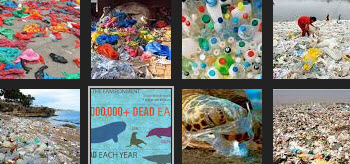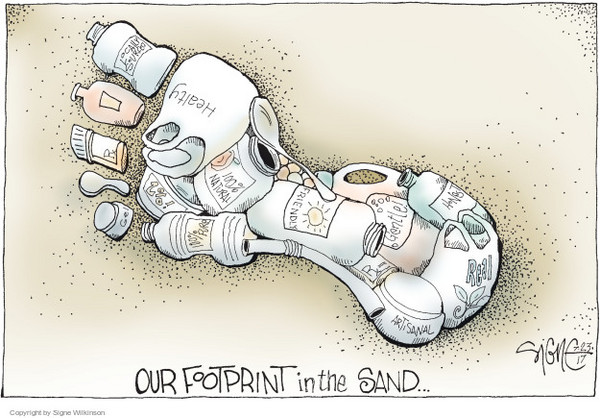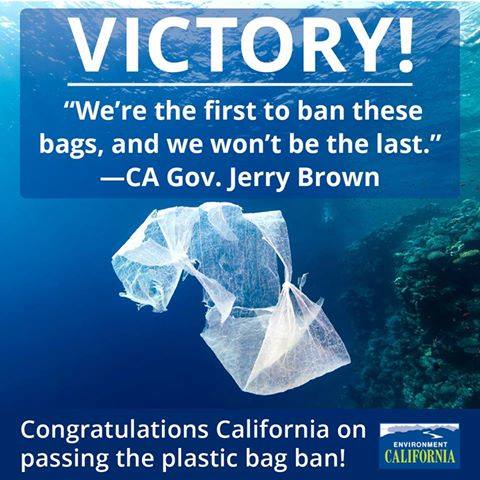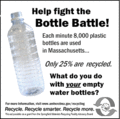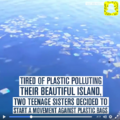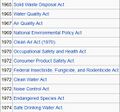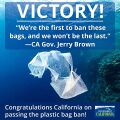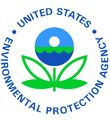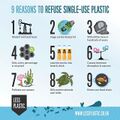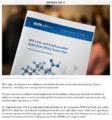Category:Plastic Pollution
● http://www.biologicaldiversity.org/campaigns/ocean_plastics/
A Few Preposterous Facts about Plastic Pollution (Via EcoWatch)
● Over the last ten years we have produced more plastic than during the whole of the last century.
● 50 percent of the plastic we use, we use just once and throw away.
● Enough plastic is thrown away each year to circle the earth four times.
● We currently recover only five percent of the plastics we produce.
● The average American throws away approximately 185 pounds of plastic per year.
● Plastic accounts for around 10 percent of the total waste we generate.
● The production of plastic uses around eight percent of the world's oil production (bioplastics are not a good solution as they require food source crops).
● Americans throw away 35 billion plastic water bottles every year (Source: Brita)
● Annually approximately 500 billion plastic bags are used worldwide. More than one million bags are used every minute.
● It takes 500-1,000 years for plastic to degrade.
● Virtually every piece of plastic that was ever made still exists in some shape or form (with the exception of the small amount that has been incinerated).
● Plastic chemicals can be absorbed by the body—93 percent of Americans age six or older test positive for BPA (a plastic chemical).
● Some of these compounds found in plastic have been found to alter hormones or have other potential human health effects.
● Plastic in the ocean breaks down into such small segments that pieces of plastic from a one liter bottle could end up on every mile of beach throughout the world.
● Billions of pounds of plastic can be found in swirling convergences in the oceans making up about 40 percent of the world's ocean surfaces. 80 percent of pollution enters the ocean from the land.
● 46 percent of plastics float (EPA 2006) and it can drift for years before eventually concentrating in the ocean gyres.
● The Great Pacific Garbage Patch is located in the North Pacific Gyre off the coast of California and is the largest ocean garbage site in the world. This floating mass of plastic is twice the size of Texas, with plastic pieces outnumbering sea life six to one.
● Plastic constitutes approximately 90 percent of all trash floating on the ocean's surface, with 46,000 pieces of plastic per square mile.
● One million sea birds and 100,000 marine mammals are killed annually from plastic in our oceans. 44 percent of all seabird species, 22 percent of cetaceans, all sea turtle species and a growing list of fish species have been documented with plastic in or around their bodies.
● Pieces of plastic: In collection surveys of the US Great Lakes, 85 percent of the plastic particles were smaller than two-tenths of an inch, and much of that was microscopic. Researchers found 1,500 and 1.7 million of these particles per square mile.
Plastic Pollution Solutions
● http://www.surfrider.org/programs/plastic-pollution
● http://plastic-pollution.org/
● http://oceancrusaders.org/plastic-crusades/
● http://www.plasticpollutioncoalition.org/
Plastic Clean-up Champion
- Model of What Can Be Done with a Strategy and Purpose: Afroz Shah in Mumbai
- Inspiration and Action
- I am an ocean lover and feel that we owe a duty to our ocean to make it free of plastic. I just hope this is the beginning for coastal communities across India and the world.
Afroz Shah, a young Indian lawyer from Mumbai, is synonymous with the world’s largest beach clean-up project.
In October 2015, Shah and his neighbor Harbansh Mathur, an 84-year-old who has since passed away, were frustrated with the piles of decomposing waste that had washed up and completely overwhelmed the city’s Versova beach. Determined to do something about it, the pair started cleaning up the beach themselves, one piece of rubbish at a time.
Every weekend since, Shah has inspired volunteers to join him – from slum-dwellers to Bollywood stars, from schoolchildren to politicians. They have been turning up at Versova for what Shah calls "a date with the ocean", but what in reality means labouring shin-deep in rotting garbage under the scorching Indian sun.
So far, the volunteers have collected over 4,000 tons of trash from the 2.5 kilometre beach.
Shah, who rallied residents and fisherfolk by knocking on doors and explaining the damage marine litter causes, now plans to expand his group’s operation to prevent litter from washing down the local creek and onto the beach. He also wants to clean-up the coastline’s rubbish-choked mangrove forests, which act as a natural defense against storm surges, and to inspire similar groups across India and beyond to launch their own clean-up movements.
Shah is deservedly proud of the Versova residents' accomplishments. Not only has the movement brought marine little to the attention of decision-makers, it is also starting to win back the beach, with decreasing amounts of new litter appearing each month.
He vows to continue his beach clean-up crusade until people and their governments around the world change their approach to producing, using and discarding plastic and other products that wash up onto beaches all over the world.
http://www.unep.org/championsofearth/laureates/2016/afroz-shah
○
San Francisco Just Passed the Nation's Toughest Ban on Polystyrene Products (2016)
- Model Legislation / Green Best Practices
June 2016 / San Francisco - "Foam Product Banned
The San Francisco Board of Supervisors on Tuesday unanimously voted to outlaw a host of commonly used foam products, in a move hailed as the nation’s most extensive such ban.
The ban applies to polystyrene food packaging, packing peanuts, to-go containers, coffee cups and pool toys, among other things. For most products, the ban will take effect Jan. 1, 2017. For meat and fish trays, it becomes effective July 1, 2017. The bill’s sponsors argued that such foam products, which are not biodegradable, pollute waterways and can harm animal life. They touted the ban as an example of the city’s leadership on environmental issues.
https://sfgov.legistar.com/View.ashx?M=F&ID=4400880&GUID=01FD9FA2-C693-4B54-AF95-5DAB6679FC83
http://www.motherjones.com/environment/2016/06/san-francisco-ban-styrofoam-polystyrene
○
http://www.savesfbay.org/sites/default/files/Ban%20status_6-25-12.pdf (2012)
http://www.ci.milpitas.ca.gov/_pdfs/eng_EPS_Study_Appendices.pdf (Calif cities w/ bans 2011)
○ ○ ○ ○ ○ ○ ○ ○ ○ ○ ○ ○ ○ ○ ○ ○ ○ ○ ○ ○ ○ ○ ○
Read and Watch:
http://en.wikipedia.org/wiki/Plastic_pollution
http://www.nrdc.org/oceans/plastic-ocean/
http://news.nationalgeographic.com/news/2015/02/150212-ocean-debris-plastic-garbage-patches-science/
https://www.youtube.com/watch?v=1qT-rOXB6NI
Eight Million Tons of Plastic Dumped in Ocean Every Year
It's equal to five grocery bags per every foot of coastline around the globe...
○ ○ ○ ○ ○ ○ ○ ○ ○ ○ ○ ○ ○ ○ ○ ○ ○ ○ ○ ○ ○ ○ ○ ○ ○ ○ ○ ○ ○ ○ ○ ○
http://www.economist.com/blogs/graphicdetail/2015/02/daily-chart-14
Plastic clean-up of oceans, a big idea from Holland -- https://www.youtube.com/watch?v=ZCR2V1HAq78
○ ○ ○ ○ ○ ○ ○ ○ ○ ○ ○ ○ ○ ○ ○ ○ ○ ○ ○ ○ ○ ○ ○ ○ ○ ○ ○ ○ ○ ○ ○ ○ ○ ○ ○
Subcategories
This category has the following 6 subcategories, out of 6 total.
Pages in category "Plastic Pollution"
The following 26 pages are in this category, out of 26 total.
A
E
G
- Green Marketing
- Green Stories of the Day
- Green Stories of the Day - GreenPolicy360 Archive
- GreenPolicy360 Archive Highlights 2013
- GreenPolicy360 Archive Highlights 2014
- GreenPolicy360 Archive Highlights 2015
- GreenPolicy360 Archive Highlights 2016
- GreenPolicy360 Archive Highlights 2017
- GreenPolicy360 Archive Highlights 2018
- GreenPolicy360 Archive Highlights 2019
- GreenPolicy360 Archive Highlights 2020
- GreenPolicy360 Archive Highlights 2023
S
Media in category "Plastic Pollution"
The following 36 files are in this category, out of 36 total.
- Amherst-Bottle.gif 364 × 360; 35 KB
- Bali to Ban Plastic Pollution.png 708 × 708; 425 KB
- Ban on Plastic Bags approved in Calif.jpg 350 × 164; 34 KB
- BantheBag California-OutinFront.png 519 × 715; 449 KB
- Battle for Democracy.jpg 640 × 123; 24 KB
- Ben Lecomte enters the Pacific.jpg 780 × 438; 64 KB
- Big Wobble 2020.jpg 507 × 342; 79 KB
- Biodegradable products--need for smarter product packaging.png 407 × 585; 34 KB
- Carbon-footprint small or large.jpg 149 × 258; 0 bytes
- Challenge of Acting for the Commons.png 700 × 548; 175 KB
- Citizens Climate Lobby - Save Our Future Act 2021.jpg 518 × 262; 77 KB
- Env policy laws US 'the beginning' of env era.jpg 370 × 345; 65 KB
- Environment California - Jerry Brown quote on plastic bags.jpg 480 × 480; 45 KB
- Environmental Justice and Environmental Law.jpg 274 × 668; 108 KB
- Environmental Protection Agency logo.png 380 × 414; 39 KB
- Fact Checking organizations at work.jpg 800 × 390; 44 KB
- Facts Count-WaPo Reports-19127 false-misleading claims in 1226 days.jpg 601 × 489; 100 KB
- GP360 tagcloud2 m.png 531 × 324; 132 KB
- GreenPolicy360 - May- 9-2024.png 800 × 406; 119 KB
- Joe Biden is projected winner Nov7-2020.jpg 343 × 120; 26 KB
- March for Science-1.png 800 × 291; 596 KB
- No to single-use plastic.jpg 640 × 640; 63 KB
- Ocean Friendly Restaurants - Surfrider Foundation.jpg 499 × 960; 110 KB
- Ocean Pollution w Plastic.png 1,524 × 534; 1.62 MB
- PFAS - 1.png 640 × 335; 177 KB
- PFAS - 2.png 800 × 858; 744 KB
- Plastic in the sand.JPG 600 × 418; 96 KB
- Plastic packaging, plastic pollution.jpg 480 × 640; 55 KB
- Rethink thru Recycle.png 720 × 960; 552 KB
- Story telling and science education.png 515 × 480; 171 KB
- The Ocean Cleanup May2015.jpg 1,000 × 563; 39 KB
- The Story of Bottled Water video.png 702 × 395; 97 KB
- Tracking Biden's Environmental Record - WaPo - Feb 2021.jpg 766 × 326; 64 KB
- Tracking Biden's Environmental Record - WaPo listing - Feb 2021.jpg 588 × 397; 35 KB
